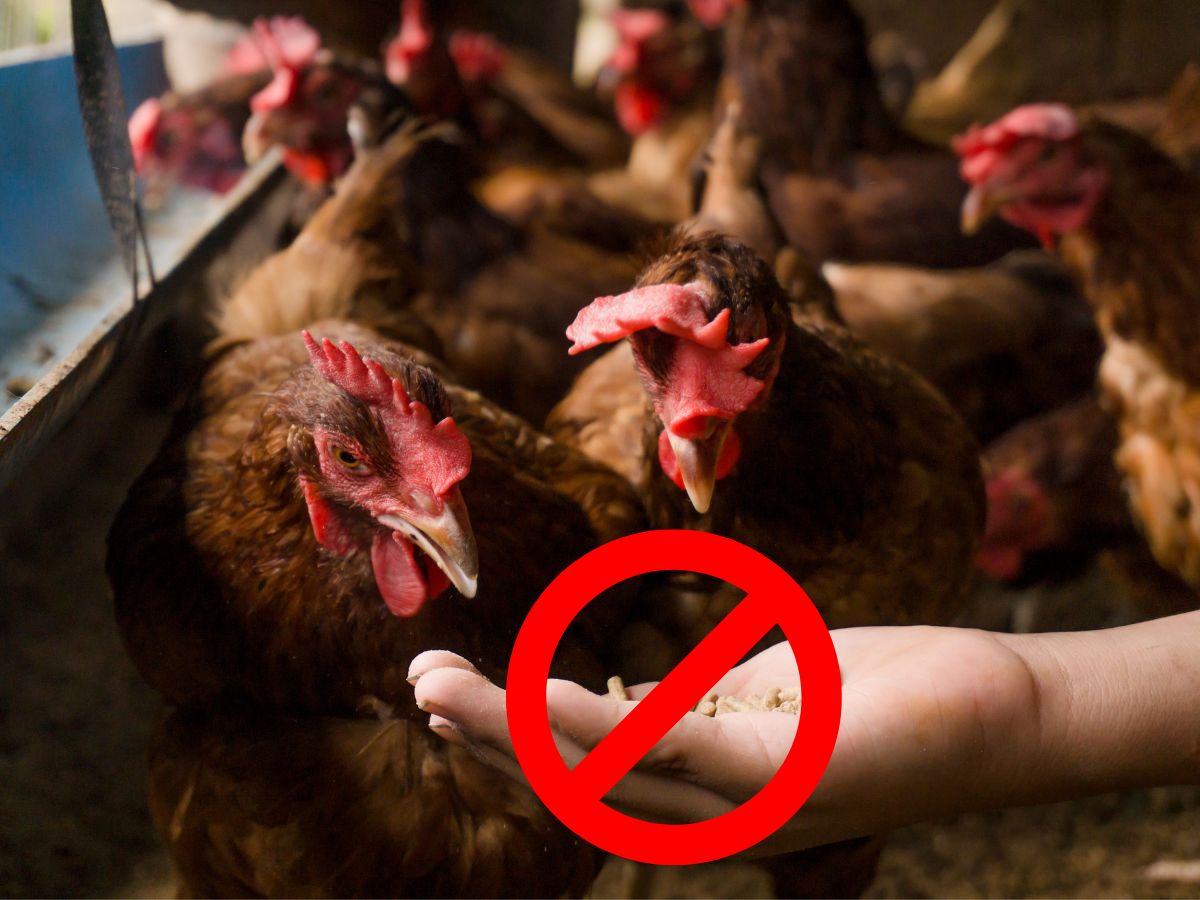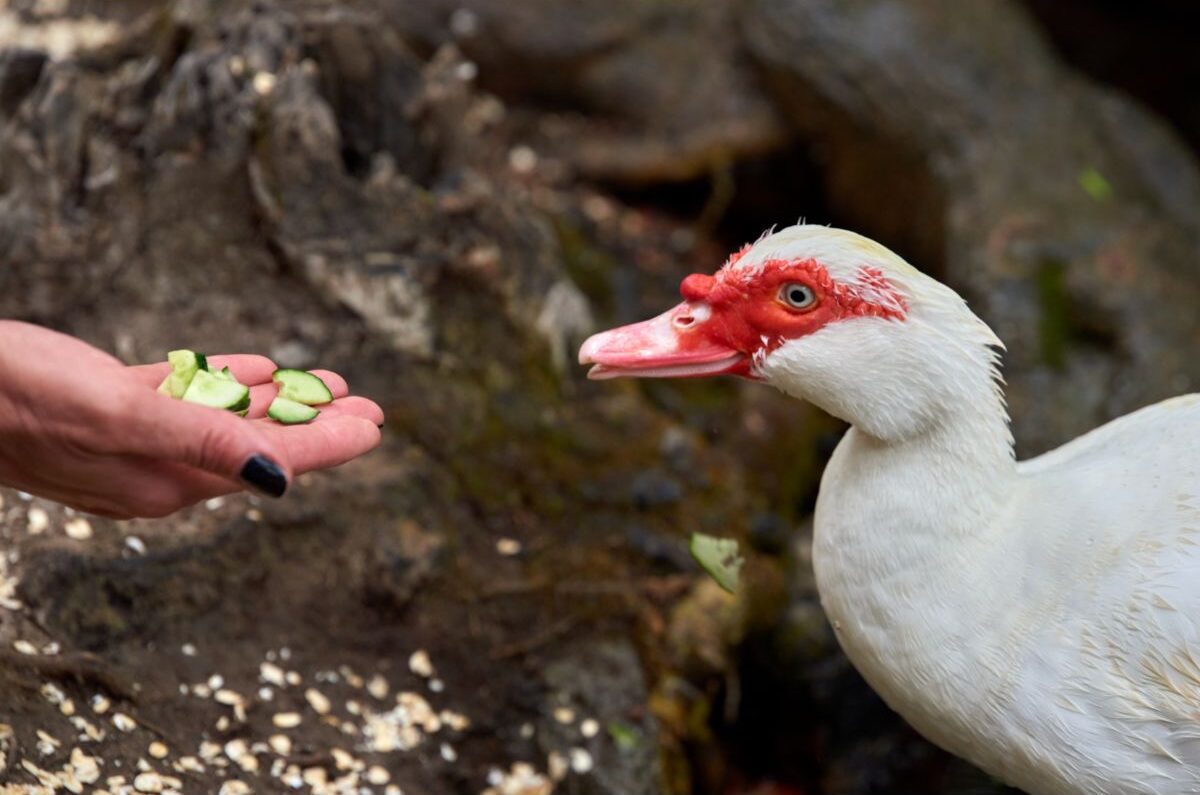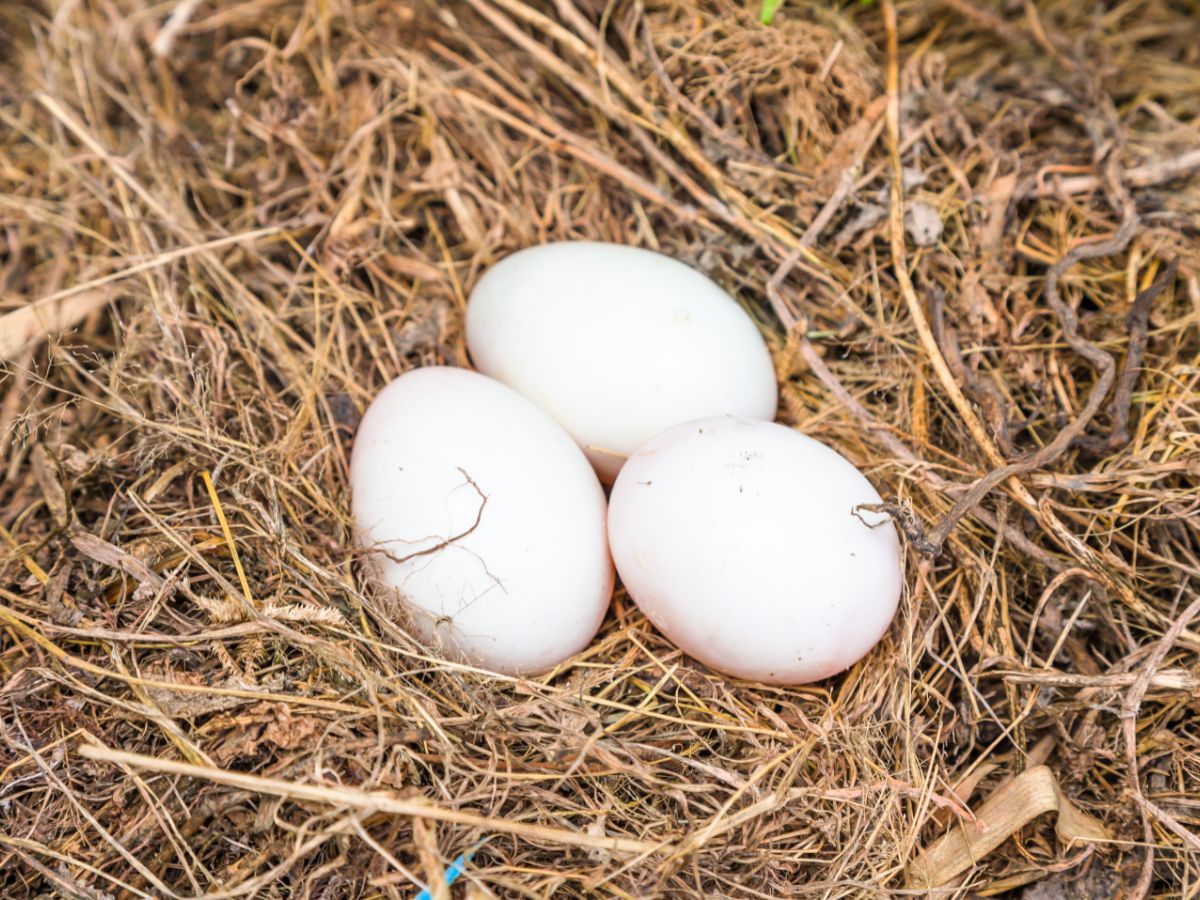As a backyard chicken raiser, feeding kitchen scraps to your chickens is a fantastic way to eliminate food waste while treating the girls with a tasty snack. However, chickens are omnivores and true opportunistic eaters. So, as responsible owners, we need to keep the don’ts in mind when feeding our birds.
Chickens should never eat the skin, vines, and leaves of potatoes, tomatoes, eggplants, and peppers. They should also steer clear from avocado skins and pips, chocolate, caffeine, raw dried beans, rhubarb, onions, and citrus. Lastly, avoid feeding your chickens moldy, processed, or sugary foods.
While some goods serve as healthy snacks for chickens, some deem unhealthy and even toxic. We’re here to help you clear the confusion about what foods to avoid feeding your girls.
Contents
What Should Chickens Never Eat?
While some foods and drinks clearly don’t have a place in the chicken coop, like alcohol, takeout, and caffeine, other foods deem equally unhealthy.
So, the primary rule is: If it isn’t good for you, it’s usually a poor choice for chickens.
Avoid feeding your girls’ processed foods loaded with sugars and salt. In addition, moldy foods are a no-go as the fungus and harmful bacterial growth can be deadly.
Then, handfuls of leafy vegetation may pose a danger to your hens. Avoid nightshade vegetable vegetation (potato, peppers, and tomatoes).
You’ll also want to be careful when giving your girls citrus fruit. While not toxic, excess amounts of citrus can be dangerous.
However, fortunately, you can feed your chickens pretty much all other veggie trimmings and leftover dairy items. However, you should limit the ratio to 10% snacks.
Here is an article about which foods chickens can eat without problems.
If you’re still interested, continue reading − we will discuss this in a bit more detail. We’re also going to include what to avoid feeding chickens to prevent soft shells or funky tasting eggs.
10 Foods Chicken Should Never Eat – Toxic Treats
The following ten foods are harmful or potentially toxic for chickens, although not necessarily fatal in tiny amounts for healthy chickens. We don’t want to take the chance and harm any of our girls.
So, avoid feeding these “toxic treats” to your chickens:
1. Chickens Shouldn’t Eat Processed or “Junk” Foods
Highly processed or oily foods aren’t good for you or your hens. Simply put, your chickens should not eat foods that are too salty, sweet, or fried.
Your ladies can become overweight from processed foods, dramatically affecting their health and laying ability.
2. Moldy & Rotten Foods Are Obviously Bad Toxic To Chickens
While stale or overripe foods are suitable to feed to chickens, molded or rotten foods should never be given to them.
You can feed your girls
- Overripe fruits, like a wrinkled apple
- Wilted veggies, e.g. a wilting head of lettuce
- Stale bread or cereal products, like dry and hard bread
3. Avocadoes Peels & Pits Are Toxic To Chickens
Chickens shouldn’t eat avocado leaves, skins, or pits.
These avocado components contain persin, a toxic compound that can harm fouls, including chickens. In addition, avocado ingestion is associated with myocardial necrosis in birds.
While several flock owners report feeding avocado flesh to their chickens without any problem, most sources advise steering clear from avocado altogether.
4. Avoid Giving Chocolate Or Caffeine To Chickens
Most of us won’t feed chocolate or caffeine to our hens. However, we’re adding it to the list of some of you who wonder whether your girls may have the same cravings.
Chocolate contains Theobromine, a compound thought to be toxic to poultry. But then, caffeine is a methylxanthine that’s harmful to chickens.
5. Green Potato Skins Are Toxic To Chickens
Like most nightshade plants, raw, green potato skins contain solanine, a toxic compound that can pose a danger to chickens. The same applies to the potato plant’s stems, vines, and leaves.
Solanine can cause heart failure and diarrhea.
However, cooking potatoes at high heat can reduce the solanine, making cooked potatoes less dangerous for chickens.
Note that its sweeter counterpart is perfectly safe for your chickens. Sweet potatoes belong to the morning glory, not the nightshade family.
6. Chickens Shouldn’t Eat Leaves/ Stems Of Nightshades Plants
The leaves and stems of the nightshade family, including potatoes, tomatoes, eggplants, and peppers, are potentially toxic to chickens.
Green or immature tomato and eggplant flesh contain too much solanine, and large amounts are dangerous for your girls to consume.
You can feed them ripe nightshades from your summer garden; however, ensure to keep it in moderation.
7. Avoid Feeding Raw Dried Bean To Chickens
While fresh or cooked beans are perfectly safe for your hens, their raw, dried counterparts are a big no-no!
Raw dried beans contain hemagglutinin (or phytohemagglutinin), a natural insecticide harmful to humans and animals.
Ensure you soak and cook beans properly before feeding them to your chickens. Note: Sprouted beans are also safe to feed to your chickens. Apparently, the sprouting process also kills hemagglutinin.
8. Limit Or Avoid Feeding Citrus To Chickens
Unfortunately, the jury is out on how much citrus is safe for chickens. While reports vary, we recommend throwing your citrus peels away.
Citrus tends to interfere with calcium absorption in chickens, contributing to thin-shelled eggs and fewer eggs.
Don’t be too concerned if there are orange bits in your table scraps. Your girls will usually skip the orange section anyway.
9. Rhubarb Is Toxic To Chickens
Rhubarb contains anthraquinones, compounds thought to have laxative effects. In addition, the entire rhubarb plant contains oxalic acid, which can interfere with calcium absorption and cause soft-shelled eggs.
The oxalic acid in rhubarb binds with calcium, preventing their bodies from absorbing efficiently.
Of course, the last thing you want in egg-laying chickens is soft-shelled eggs since eggshells are composed nearly entirely of calcium.
While discussing oxalic acid, you’ll also want to limit your chickens’ spinach intake.
10. Limit Feeding Onions To Chickens
Onions contain thiosulphate, a toxin that destroys red blood cells.
Excessive amounts of onion can cause jaundice, anemia, and even death in your hens. On the other hand, tiny quantities are generally harmless. So, you won’t have to go out of your way to remove onions from a dish. However, aim to avoid feeding the chickens onions wherever possible.
While garlic belongs to the same family as onions, garlic only contains about 1/15th of thiosulphate. So, you can feed your ladies garlic cloves for their other fantastic health benefits.
Some claim that onions and garlic may taint the taste of your eggs.
Limit Your Chickens’ Snacks To 10% Of Their Diet
Along with feeding your hens a wide variety of moods, you’ll want to limit their snacks to 10% of their diet.
Although leafy greens, grains, and fruit are packed with vitamins and minerals beneficial to chickens, excessive amounts will take a toll on their bodies.
Therefore, limit treats to no more than 10% of their diet.
Conclusion
Chickens mostly avoid foods that aren’t good for them. However, you can’t always trust your girls to steer clear of toxic foods, especially when food is scarce.
So, avoid feeding them potentially “toxic treats.” In addition, limit healthy treats to 10% of their diet.




